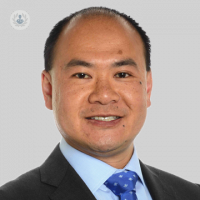How do implantable cardiovascular defibrillators work?
Written in association with:Implantable cardiovascular defibrillators (ICDs) help to offer patients at risk of dangerous heart rhythms peace of mind by monitoring the heart rate and correcting it if needed. In this detailed guide to ICDs, highly respected consultant cardiologist Dr Fu Siong Ng expertly explains how this life-saving technology works and how they are maintained throughout a patient’s lifetime. The leading specialist also details the different types of ICDs available.

What does an ICD treat?
ICD stands for an implantable cardiovascular defibrillator which is a special sort of pacemaker device that we implant into patients to treat abnormal heart rhythms. Some patients are at greater risk of dangerous heart rhythms which can lead to their heart stopping; for instance, you may have heard on the news about some famous footballers who have collapsed whilst playing football. That happens because their heart goes into a very dangerous rhythm which causes the heart to stop.
The benefit of this device is that it is in place, monitoring every single heartbeat. When there is a dangerously abnormal heart rhythm, it will deliver a strong electric shock to resynchronize the heart rhythm and restart the heart to help it get back to normal. Therefore this is a really crucial device that can save someone's lives if needed.
How do ICDs work?
There are two types of defibrillators. The most common one is we call a transient defibrillator which has a big battery in the shoulder that's connected by at least one lead (and sometimes more) into the vein and the heart itself.
The second type is what we call a subcutaneous defibrillator which is predominantly just under the skin, but is not inside the blood vessels and doesn’t touch the heart. This type of defibrillator works by recording every single heartbeat and using a very sophisticated algorithm, a sort of computer device, that monitors when the heart has gone into a dangerous rhythm. At that time, it delivers an electric shock.
If it's a transvenous device in the heart, this shock is delivered through a lead in the heart and the big battery in the shoulder. In devices implanted under the skin, the electric shock is administered through the lead and generator.
Do shocks from an ICD hurt?
Unfortunately, shocks from an ICD can be very painful. Patients who have received a shock whilst awake have described the feeling as being similar to a kick in the chest from a horse. However, most of the time, the ICD kicks in when the patient truly needs it and as such, they may be unconscious and therefore don't really feel the shock.
It’s also important to remember that this is a life-saving device which resets the heart rhythm after the heart has stopped beating. So it is a very useful device and even if the patient is conscious and is aware of the shock, although they may experience discomfort, it may well save their life.
How are ICDs powered?
The ICD is powered internally with a battery in the generator. It's quite a sophisticated piece of hardware and on average, the battery can last about ten years.The generator contains the battery, the larger part found under the shoulder, and this is the part that we have to change every ten years or so. Of course, with battery technology always improving, they may last longer in the future.
Nonetheless, anyone who has an ICD does need repeated battery changes to make sure the device continues to work. Obviously, a patient who has a lot more shocks than others may need the battery to be changed more frequently. As the power comes through an internal battery part of the device, there is no recharging that the patient needs to do while it's in place and they can forget about it for ten years. As part of our follow-up, we know when the battery is depleting and so we call them back to have a procedure to replace it when the time is right.
What can affect the functionality of an ICD?
There is little that can affect the functionality of ICDs. These are clearly very important devices which can save patients' lives and so the medical companies which make them have gone a very long way to try and ensure that they cannot easily be interfered with.
One factor that can affect how ICDs function are huge magnetic fields, which can reset the defibrillator or alter its function should the patient be in such a place. However, I encourage my patients not to worry about external things interfering with their device as it is extremely unlikely.
ICDs are very well designed and sophisticated pieces of equipment which can give patients peace of mind.
Dr Ng is one of the UK’s leading consultant cardiologists and is expert in implantable cardioverter defibrillators. If you are concerned about your heart health and wish to book a consultation with Dr Ng, you can do so by visiting his Top Doctors profile.


